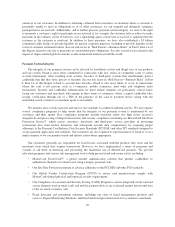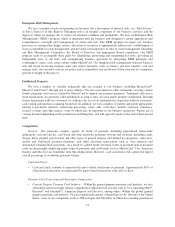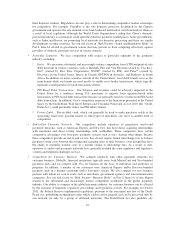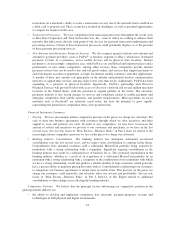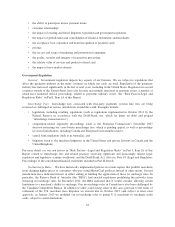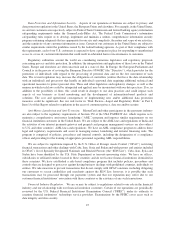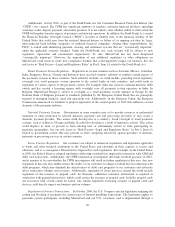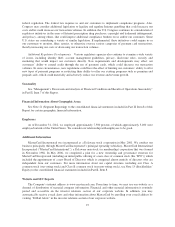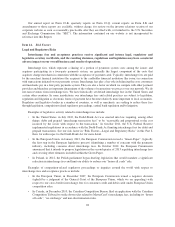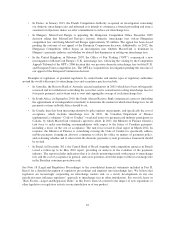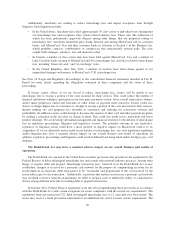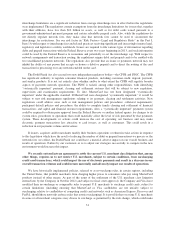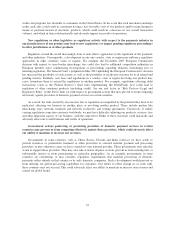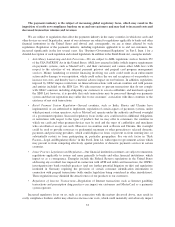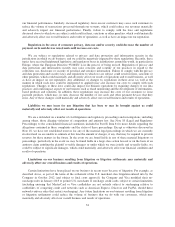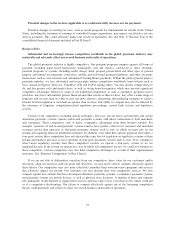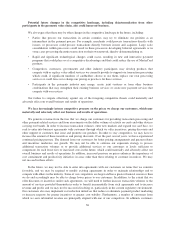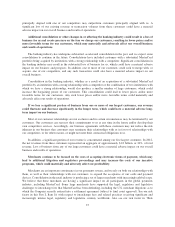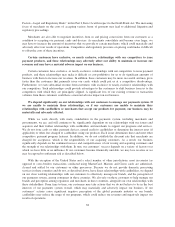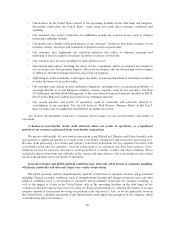MasterCard 2012 Annual Report Download - page 34
Download and view the complete annual report
Please find page 34 of the 2012 MasterCard annual report below. You can navigate through the pages in the report by either clicking on the pages listed below, or by using the keyword search tool below to find specific information within the annual report.Additionally, merchants are seeking to reduce interchange fees and impact acceptance rules through
litigation. Such litigation includes:
• In the United States, merchants have filed approximately 50 class action or individual suits alleging that
our interchange fees and acceptance rules violate federal antitrust laws. These suits (the settlement of
which has been preliminarily approved) alleged, among other things, that our purported setting of
interchange fees constitutes horizontal price-fixing between and among MasterCard and its customer
banks, and MasterCard, Visa and their customer banks in violation of Section 1 of the Sherman Act,
which prohibits contracts, combinations or conspiracies that unreasonably restrain trade. The suits
sought treble damages, attorneys’ fees and injunctive relief.
• In Canada, a number of class action suits have been filed against MasterCard, Visa and a number of
large Canadian banks relating to MasterCard and Visa interchange fees and rules related to interchange
fees, including “honor all cards” and “no surcharge” rules.
• In the United Kingdom, since May 2012, a number of retailers have filed claims against us for
unspecified damages with respect to MasterCard’s U.K. interchange fees.
See Note 18 (Legal and Regulatory Proceedings) to the consolidated financial statements included in Part II,
Item 8 for more details regarding the allegations contained in these complaints and the status of these
proceedings.
If issuers cannot collect, or we are forced to reduce, interchange fees, issuers will be unable to use
interchange fees to recoup a portion of the costs incurred for their services. This could reduce the number of
financial institutions willing to participate in our four-party payments system, lower overall transaction volumes,
and/or make proprietary end-to-end networks or other forms of payment more attractive. Issuers could also
choose to charge higher fees to consumers to attempt to recoup a portion of the costs incurred for their services,
thereby making our card programs less desirable to consumers and reducing our transaction volumes and
profitability. In addition, issuers could attempt to decrease the expense of their card and other payment programs
by seeking a reduction in the fees that we charge to them. This could also result in less innovation and fewer
product offerings. We are devoting substantial management and financial resources to the defense of interchange
fees in regulatory proceedings, litigation and legislative activity. The potential outcome of any legislative,
regulatory or litigation action could have a more positive or negative impact on MasterCard relative to its
competitors. If we are ultimately unsuccessful in our defense of interchange fees, any such legislation, regulation
and/or litigation may have a material adverse impact on our overall business and results of operations. In
addition, regulatory proceedings and litigation could result in MasterCard being fined and/or having to pay civil
damages.
The Dodd-Frank Act may have a material adverse impact on our overall business and results of
operations.
The Dodd-Frank Act enacted in the United States includes provisions that provide for the regulation by the
Federal Reserve of debit and prepaid interchange fees and certain other network industry practices. Among other
things, it requires debit and prepaid “interchange transaction fees” (referred to in the Dodd-Frank Act as fees
established, charged or received by a payment card network for the purpose of compensating an issuer for its
involvement in an electronic debit transaction) to be “reasonable and proportional to the cost incurred by the
issuer with respect to the transaction.” Additionally, it provides that neither an issuer nor a payment card network
may establish exclusive network arrangements for debit or prepaid cards or inhibit the ability of a merchant to
choose among different networks for routing debit or prepaid transactions.
In October 2011, Federal Reserve regulations went into effect implementing these provisions in accordance
with the Dodd-Frank Act (with certain exceptions for issuer compliance with the exclusivity requirements). The
regulations limit per-transaction U.S. debit and prepaid interchange fees to 21 cents plus five basis points. The
issuer may receive a fraud prevention adjustment of an additional one cent if it meets certain requirements. The
30


